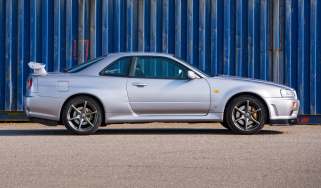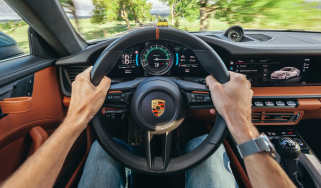‘Brown Chords shot to fame in 1966, taking their place as one of Britain’s top eleven bands’
Lost’ film footage of a 1960s band and their cars has Porter intrigued

There was excitement among music fans with the release of Sod Off!, a brand new documentary series charting the troubled recording of Are You Hearing That?, the eighth album from legendary British band Brown Chords.
As fans will know, BC shot to fame in 1966, rightly taking their place as one of Britain’s top eleven bands. Soon afterwards they broke America and then spent four years revisiting the place trying to fix things. By the start of the ’70s all was not well in the Chords camp as this punishing trans-Atlantic travel schedule left the so-called ‘Super Six’ exhausted to the extent that lead singer Pete ‘Banjo’ Straddling once tried to get off a Pan Am 707 that hadn’t finished flying. The band realised they needed a breather and in autumn 1970 put out a statement saying they were ‘taking a break from making great music’, prompting Tidge Bixon from rival group Gee String to quip ‘I didn’t know they’d started.’
The six Brown Chords intended to remain apart for a whole year but when rumour spread that drummer Shib Slipton might start a solo career they agreed to reform early ‘just in case’. That reformation took place at Tonedeaf Studios near Marlow in the presence of a film crew from music show Pop Sound! which was permitted access because lead singer Straddling was doing sex things with producer Lursty van Hurstenburg and most of her team. The crew filmed constantly during the two-week recording session because no one could be bothered to stop them. Unfortunately, when van Hurstenburg returned to London, her TV bosses told her the footage was unusable, mainly because Chords manager Gloster McNoclas had an on-camera habit of using foul language and also heroin. As a result, the film from that fateful fortnight spent 50 years in a vault until 2020, when Michael Crises, best known as director of the Deep Agony action movies, spent six months of his own money editing the ‘lost’ footage into a revealing documentary series.
> 'Does Ferrari make the most reliable cars in the world? I think it might.'
There are many great scenes, from guitarist Mickie Biscuit playing a guitar with his penis to bassist Ned Ketters getting attacked by a duck, but the real joy is discovering what the musicians were driving during that confusingly windy summer of 1971. The first band member we see at the wheel is organ player Mick Reasons (‘the quiet one’) who in episode one pulls up to Tonedeaf in a Mini Clubman 1275GT which looks standard, though the interior turns out to be full of liquid. Moments later we see percussionist Ken Frisbee (‘the even quieter one’) zooming into the studio courtyard in a Mini-based one-seater sports car called a Spigley Special. Frisbee then struggles to release the Spigley’s distinctive ‘goosewing’ door, it becomes clear he is trapped inside, and he remains there for the rest of the series.
Episode two brings a sequence in which guitarist Mickie Biscuit heads into a local town to buy some genital ointment at the wheel of his beautiful 1969 Ciabaratto Falco, the rare, Italian-designed, American-engined, Dutch-upholstered coupé. There’s also a brief glimpse of the purple Jax Manhammer driven by lunatic manager Gloster McNoclas, a remarkable machine created by slicing an Iso Grifo in two directions and then mostly leaving it like that. Exactly the machine you’d expect of a music industry legend famously described as having ‘the soul of a shark in the body of an even worse shark’.
Episode three is rich with cars, as we see Biscuit driving his Falco back to London to fetch some more women and observe a studio employee’s brief attempt to get Frisbee out of his Spigley with a spoon. The real treat is a whole section in which drummer Shib Slipton proudly shows off his brand new Speedwall ‘Drumtron’, a glorious custom car built for him around the chassis of a Jaguar MkX and fitted with not one but two Ford Essex V6s, bits of which are supercharged. The ‘joker’ of the group, Slipton ends the segment winking at the camera and quipping, ‘It’s not much but it gets me where I need to be’ as fire visibly rages in the rearmost engine. The episode concludes with a glimpse of bassist Ned Ketters at the wheel of his Marchfield-modified Jaguar E-type, its notorious quartet of front wheels clearly making it difficult for him to reverse out of the situation in which he finds himself, which is a lake.
Sadly, the rest of the series concentrates on the recording of the album, which was tortuous, sometimes literally. When Are You Hearing That? was released in March 1972, it was slammed by the NME for having ‘not enough percussion on it’. Brown Chords broke up soon after. Though lacking in cars for most of the 27 episodes, Sod Off! is a fascinating look at musicians clinging to glory, and sometimes a floating Jag, and is recommended to anyone with 91 hours to spare and access to the subscription version of Channel 5.






